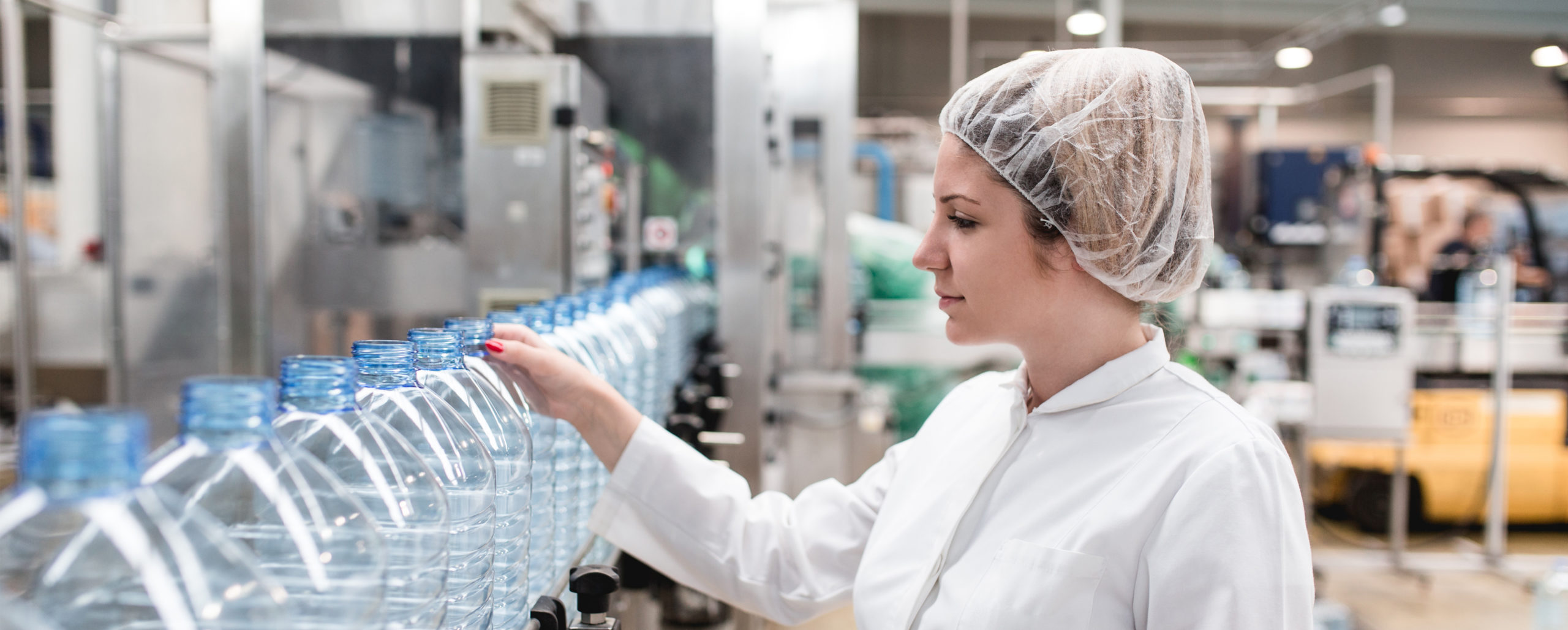
Bottled Water Filtration
Global Filter offers a complete line of filtration solutions to handle any application throughout the water bottling process. As a premier supplier of depth, pleated depth, and pleated membrane cartridges and vessels, Global Filter is your one-stop solution for all your filtration needs.
Meeting Bottled Water Filtration Requirements
The bottled water market is highly diversified and competitive and comprised of a large number of companies, including both established and start-up firms. Critical process operations, set by government legislation, must be followed by all. These operations are established to ensure a bottled water system withholds integrity and to lower the costs per unit of bottled water.
Global Filter offers a complete line of filtration solutions to help you meet critical requirements. As a premier supplier of depth, pleated depth, pleated membrane cartridges, and vessels, Global Filter is your one-stop shop for your filtration needs.
The Importance of Bottled Water Filtration
Proper filtration systems are critical in ensuring the biological safety, quality, and shelf-life of the product, as well as protecting downstream equipment. To meet required water quality standards and remain competitive, systems must integrate several filtration processes to reduce particulates, remove microorganisms, and protect equipment. When a proper filter “train” is not installed, bacteria and particulate can impact flavor and overall quality, potentially harmful for human consumption.
Common particulates include sand, silt, and organic materials from the source water, as well as scale, rust, and other debris from transfer piping, hoses, and storage tanks. In addition, microorganisms can enter the bottled water process through contaminated carbon/sand beds, air/gas supply, and damaged piping/valves. A poorly designed filtration system will lead to frequent and unnecessary element changes, unsafe products, excessive downtime, and increased operating costs.
Typical Bottled Water Filtration Process
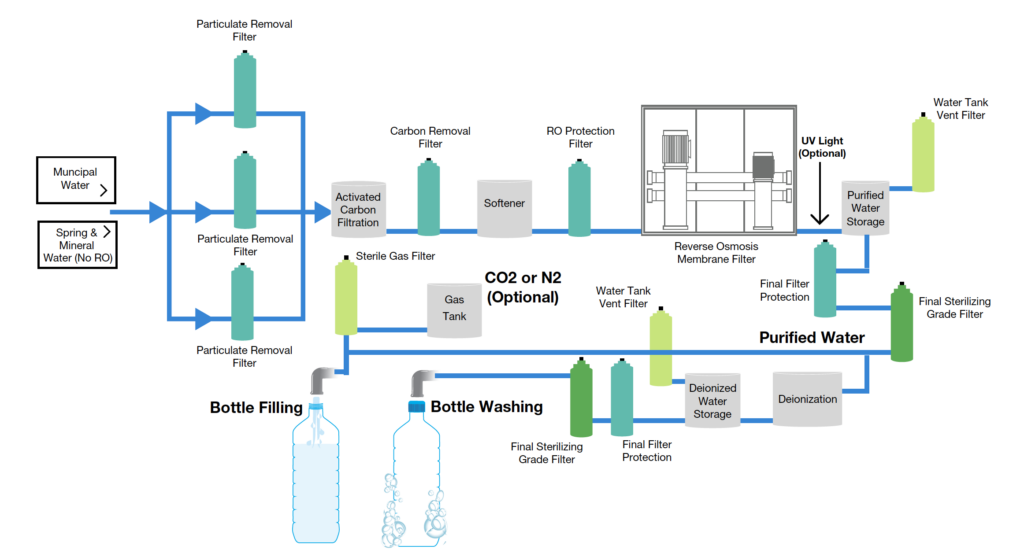
Water Bottle Filtration Solutions
Particulate Filters
High Flow – HFB, EHF3, HF, HF3 series
Pleated Polypropylene – PP, PPE Series
Pleated Microglass – FG, FGE Series
Polypropylene Meltblown – GWTB, GCTB. GATB Series
Protecting the activated carbon, deionization tanks, the RO or Ion Exchange Units (IEU), and sterilizing filters are critical. Surface or groundwater is typically treated and softened before filtration with a filter that removes particles larger than 10 microns, then filtered down to 1 to 5 microns to protect downstream equipment. Depending on your flow rate and water quality, the first filtration solution should reduce your waste and be cost-effective.
Sterilizing Grade Filters
Polyethersulfone Membrane – GFPES and BRPES Series
Nylon Membrane – GFHNY and BRHNY Series
Reduces and removes virtually microorganisms and biological contaminants down to 0.2 microns as final filtration to bottled water applications and as further polishing in downstream bottle cleaning water systems. This ensures that bottled water will be safe for human consumption and that deionization tanks will be protected.
Tank Vent Filters
PTFE Membrane – GGPTFE and PPTFE Series
Polysulfone Membrane – PSH Series
Storage and fill tank vent filtration allows for bacteria and particulate-free air to pass during an evacuation, protecting the storage tank and its contents from contamination. This filter is typically rated at 0.2 microns and is hydrophobic and bacterial retentive, which prevents moisture and airborne contaminants from entering the tank. This protects the water ensuring it is safe for human consumption and ensuring the product is not lost.
Gas Filter Stages: 11
PTFE (Hydrophobic) Membrane – GGPTFE (General Grade) & PPTFE Series (Sterilizing Grade)
Polysulfone (Hydrophobic) Membrane – PSH Series
These filter cartridge membranes serve as gas filters during the bottling and packaging stage where CO2 or N2 is present.
Why Use Global Filter Filtration Solutions?

Improve Water Quality
Remove both particulate and bacteria for improved water quality and safer consumption for consumers.

Minimize System Downtime
Reduced frequency of filter change-outs which lowers operating costs.

Protect Process Equipment
Protect equipment by installing filters at critical process points to reduce fouling.

Increase Product Output
Process more products in less time increasing your output while generating more revenue.
Literature
Download the bottled water filtration literature below for more details on our filtration solutions.
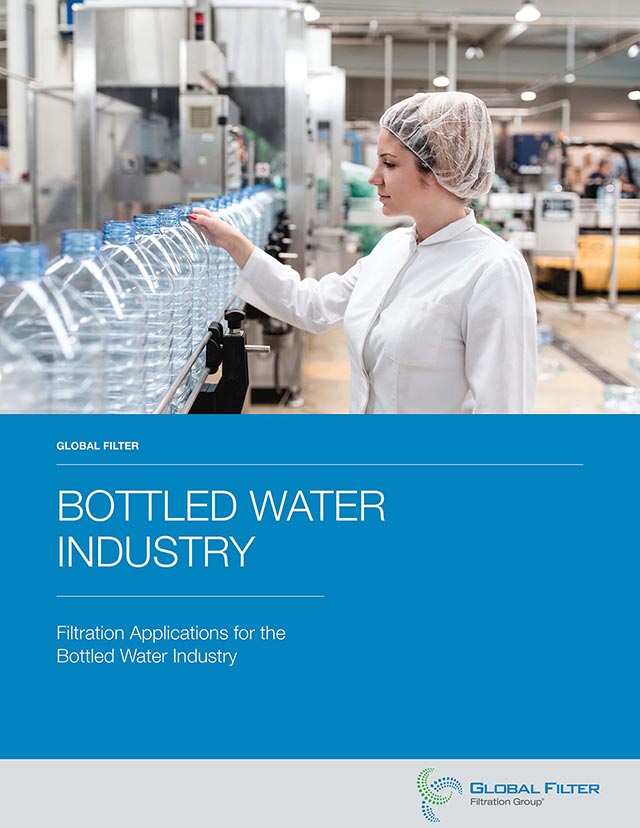
Bottled Water Application Brochure
Global Filter designs and manufactures vessels and filter elements used in the bottled water industry. Learn how our solutions can optimize your manufacturing process.
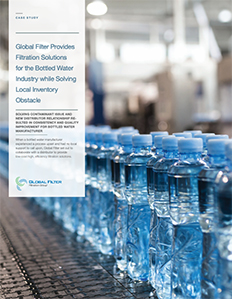
Bottled Water Case Study
In this study, Global Filter hopes to provide you with solutions for each part of your process that will improve process efficiency and save production costs and downtime.
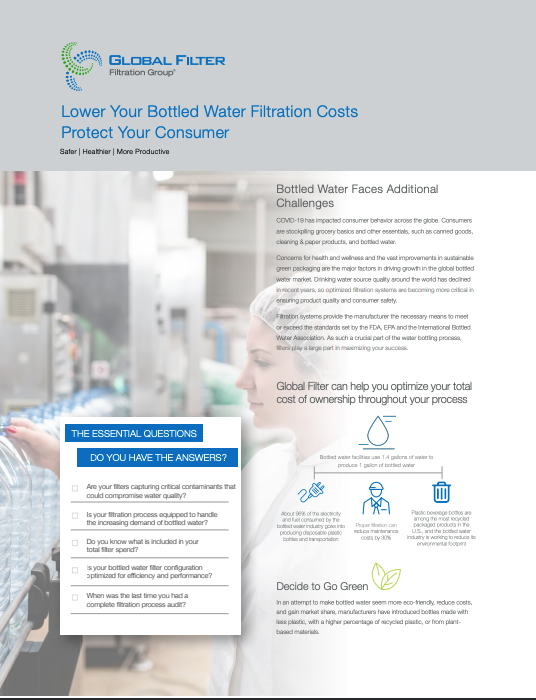
Bottled Water Fact Sheet
Quick hits on optimizing your bottled water process while ensuring product quality and consumer safety.
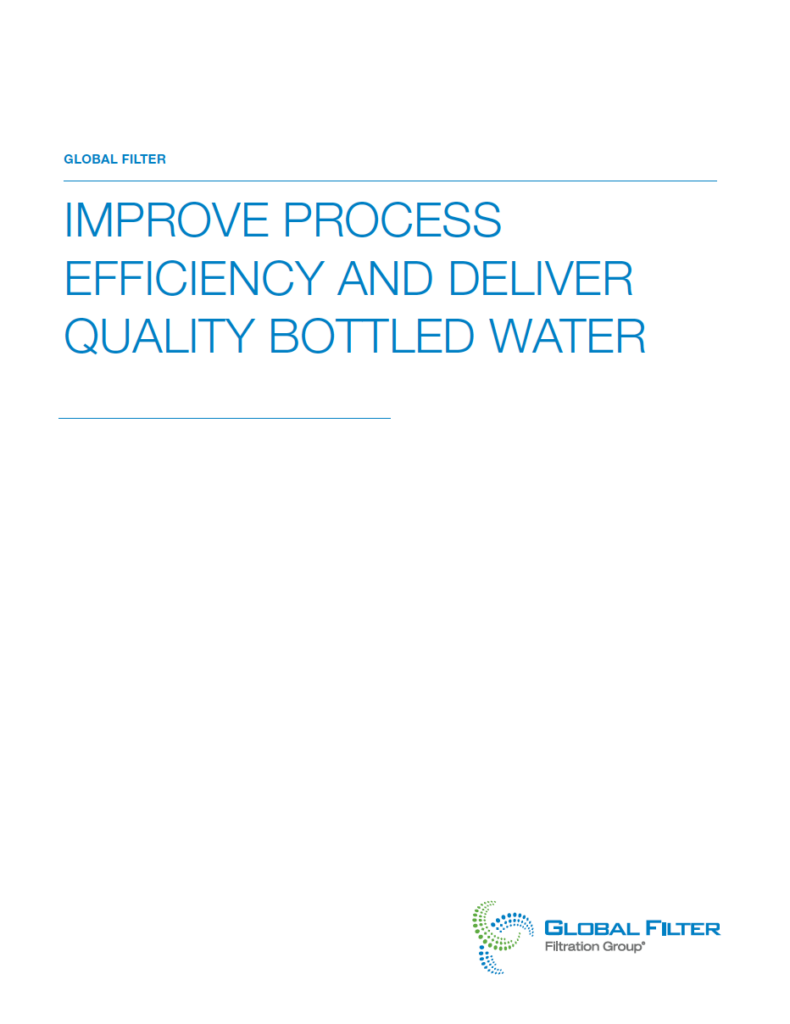
Bottled Water White Paper
This white paper explains the bottled water filtration process and key points of concern for bottlers.
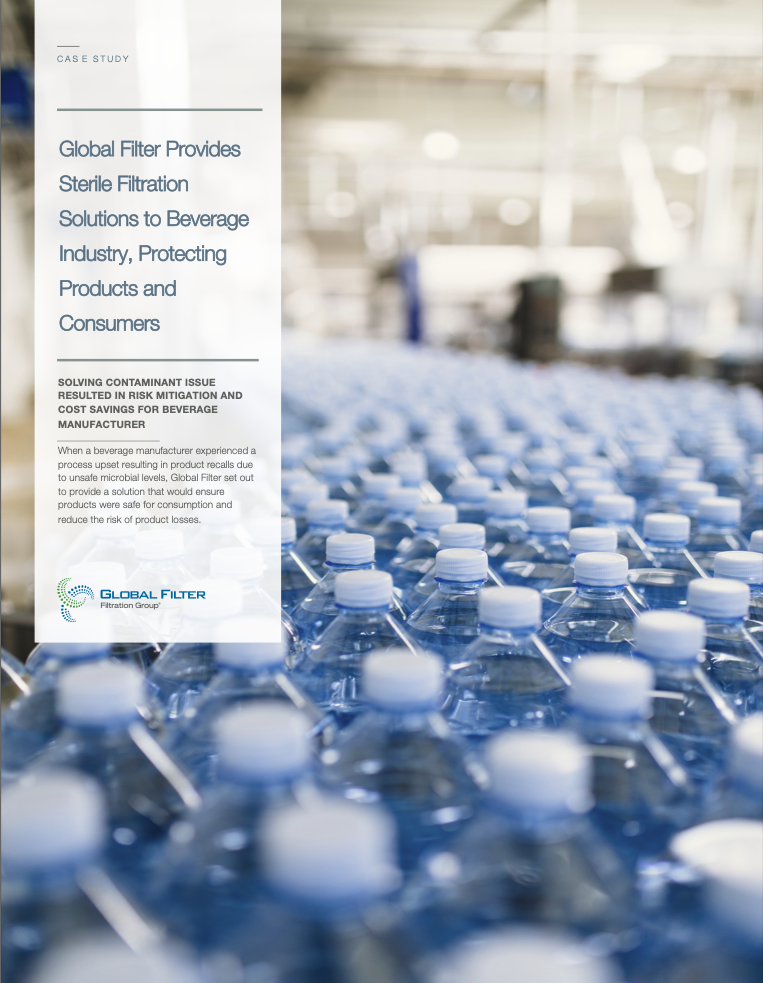
Sterile Beverage Filtration Case Study
This case study explains how Global Filter protected consumers and products.
Frequently Asked Questions
What is the importance of filtration in bottled water production?
Filtration is a critical step in the bottled water production process that helps to remove impurities and contaminants from the water. Ensuring that it is safe and clean for consumption. Filtration also plays a key role in achieving desired taste and quality characteristics of water.
What are the different types of filtration methods used in bottled water production?
There are several types of filtration methods used in bottled water production, including reverse osmosis, carbon filtration, micron filtration, and UV sterilization. Each method has its own advantages and is used based on the specific requirements of the bottled water production process.
How do I choose the right filtration method for my bottled water production process?
Choosing the right filtration method for your bottled water production process depends on several factors, including water quality, product specifications, and production volume. It’s important to work with a filtration expert like Global Filter to determine the best filtration method for your specific needs.
What are the best practices for maintaining and cleaning filtration equipment in bottled water production?
Regular maintenance and cleaning of filtration equipment is critical to ensuring optimal performance and preventing equipment failure. Best practices for maintenance and cleaning vary depending on the type of equipment but generally involve regular inspection, cleaning, and replacement of filters and other components. Sanitizing solutions, hot water, and steam sterilization are all methods to clean systems.
How often should I replace the filters in my bottled water production process?
The frequency of filter replacement in bottled water production depends on several factors, including the type of filter, water quality, and production volume. It’s important to follow the manufacturer’s recommendations for filter replacement and monitor filter performance regularly.
How does filtration impact the taste and quality of bottled water?
Filtration plays a key role in achieving desired taste and quality characteristics of bottled water by removing impurities and contaminants that can impact the taste and clarity of the water. Proper filtration can also help to preserve the natural mineral content of the water. This is especially important when bottling spring water.
What are some common challenges with filtration in bottled water production and how can they be addressed?
Common challenges with filtration in bottled water production include equipment failure, clogging of filters, and inconsistent product quality. These challenges can be addressed through regular maintenance and monitoring of filtration equipment, proper filtration process design, and adjustment of filtration parameters.
What are the regulatory requirements for filtration in bottled water production?
Regulatory requirements for filtration in bottled water production vary by jurisdiction but generally involve adherence to specific water quality standards and production practices. Typical standards to follow are from the FDA. For more information related to these standards click here. If you are unsure if you are meeting regulatory requirements contact a filtration expert at Global Filter.
What is the cost of filtration equipment for bottled water production?
The cost of filtration equipment for bottled water production varies depending on the type and size of equipment, as well as the specific requirements of the bottled water production process. To determine the best equipment for your needs and to develop an estimate for equipment purchase and maintenance contact Global Fitler.
How does filtration in bottled water production contribute to sustainability and environmental stewardship?
Filtration in bottled water production can contribute to sustainability and environmental stewardship by reducing the amount of water waste and energy consumption associated with the production process. Proper filtration can also help to reduce the use of chemicals and other additives, promoting more sustainable production practices. Optimal filtration also reduces waste by minimizing filter change-outs and cleaning.








